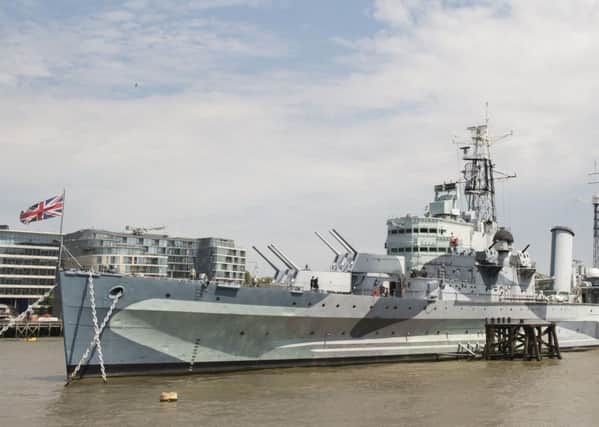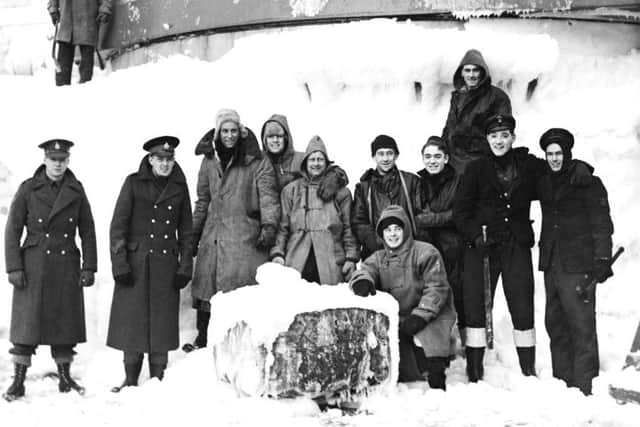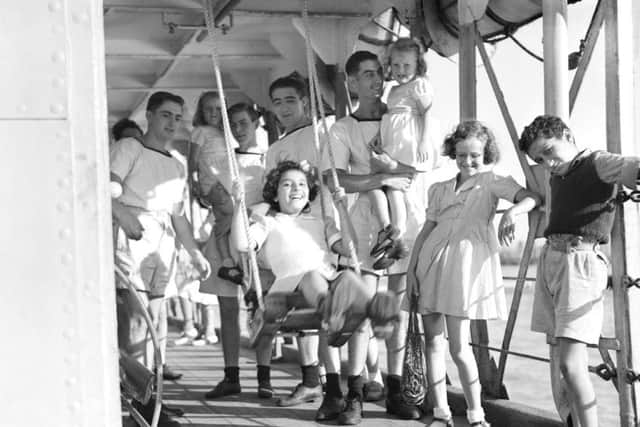Marking 80 years of legendary warship's history


She was among the bombardment fleet supporting the Normandy landings of June 6, 1944, helping to liberate internment camps in the Far East, and served in the Korean War.
Now, to mark 80 years since her launch, lost stories from the warship’s time at sea are to be shared alongside rare documents detailing a life aboard.
Advertisement
Hide AdAdvertisement
Hide AdThere will even, at celebration events to be held next weekend, be a nine-tiered cake inspired by the ship and made by Great British Bake Off winner and serving Army officer Sophie Faldo.


HMS Belfast, said senior curator Ian Kikuchi of owners the Imperial War Museum, was an “unique witness” to 20th century conflict.
“During this anniversary weekend visitors can come on board and experience the ship’s life and adventures by walking the same decks, ducking through the same hatches and climbing up and down the same ladders as the crew who served on board,” he said.
HMS Belfast was launched in 1938, and was involved in the Arctic convoys between the Allies and the Soviet Union, as well as playing a leading role in D-Day. By 1971, the ship was on the verge of being scrapped, but the Belfast Trust stepped in to save it, docking it in London and opening it to the public. It was taken over by the IWM in 1978.
Advertisement
Hide AdAdvertisement
Hide AdCelebrations are to be held on March 17 and 18 by the IWM, which now runs the vessel as a museum moored near London’s Tower Bridge.


And, as part of the anniversary celebrations, the first “certificate for wounds and hurts” issued on the warship has been revealed. The document, which records the “accidental traumatic amputation” of Boy John Campbell’s “first two phalanges” - finger bones - while carrying out a gun-drill on HMS Belfast’s 4in guns, is dated August 18, 1939, the same month the warship was commissioned into the Royal Navy.
And former ordinance artificer John Harrison, who at 104 years old is the oldest surviving Second World War veteran of HMS Belfast, is among those who has shared his memories.
“There’s some ships that are warm, and that was,” he said. “It was a lovely ship, it still is.”
Advertisement
Hide AdAdvertisement
Hide AdMr Harrison has described the dangers of serving at sea, facing German magnetic mines and treacherous Arctic conditions. There was a time, he revealed, that he narrowly avoiding being swept overboard while trying to get to his gun turret.


“I came to these big waves coming over, and I dashed to my turret, grabbed the turret door,” he said. “Another one came over, my legs went up with the water, and my hand was actually frozen onto the turret handle, otherwise I’d have gone over the side with it. I had to massage my hand when the wave’s gone to get my hand off it, open the turret door and get in. That was a scary moment.”
He also experienced the ship being hit by a German magnetic mine, feeling the deck bounce, and his head pushed down into his shoulders.
“The deck stopped bouncing, but it was very, very still and very, very dark.
Advertisement
Hide AdAdvertisement
Hide Ad“I found my way out and up, as I opened the hatch, water came pouring in and I thought ‘my God, we’ve sunk’, but one of the fire hoses had been distorted with the explosion and had directed right down my poor old hatch,” he said.